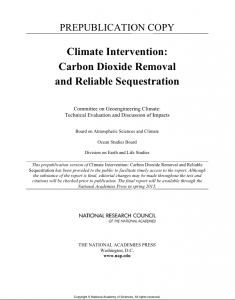Full Title: Climate Intervention: Carbon Dioxide Removal and Reliable Sequestration
Author(s): Committee on Geoengineering Climate: Technical Evaluation and Discussion of Impacts; Board on Atmospheric Sciences and Climate; Ocean Studies Board; Division on Earth and Life Studies; National Research Council
Publisher(s): National Academy of Sciences
Publication Date: February 1, 2015
Full Text: Download Resource
Description (excerpt):
For more than three decades scientists have predicted that a doubling of carbon dioxide in Earth’s atmosphere from pre-industrial levels would warm Earth’s surface by an average of between 1.5°C and 4.5°C (about 3-8°F). The latest report from the Intergovernmental Panel on Climate Change (IPCC) confirms this finding, with greater confidence, and furthermore affirms that the primary cause of the observed increase in global-average temperature is anthropogenic greenhouse gas (GHG) emissions (IPCC, 2013b). The IPCC further concludes that, if current emissions trends continue, by the end of the century the planet will experience a warming of up to 5°C (Figure 1.1), sea level will rise by as much as 1 m (Figure 1.2), and the Arctic will be ice free in the summer by mid-century. As part of this change in climate, society will experience an increase in the frequency and severity of heat waves, droughts, and heavy precipitation events (also see NCA, 2014).
